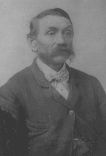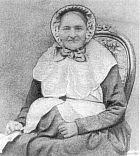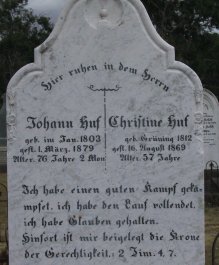Victoria
Johann and Christina Huf

Johann Huf
Johann Huf (born January 1803) married Anna Christina Grüning (born May 1812) on 18th March 1832 at Schwersenz (now the Polish town of Swarzedz), a few kilometres west of the town of Nekla, where they had both been born, in the Prussian province of Posen. They had five children, the first of which died. They were devout Lutherans, and disagreed with religious policies of the state-controlled Church in Prussia.

Christina Huf
The Hufs and others from the Nekla area made preparations to emigrate to South Australia, where others from their region had already gone to. On 15th July 1846 the Hufs received their travel pass giving them government permission to leave, and which also made clear that in receiving the pass they lost their Prussian citizenship (a pretty major step). They sailed from the port of Bremerhaven on the Heloise, a ship chartered by the emigration agent for South Australia in Bremen Eduard Delius. Christina Huf bore a son three months into the voyage near the Cape of Good Hope. This son August was two months old when the ship arrived at Port Adelaide on 17th March 1847. The Hufs along with some other immigrants moved on to Bethany in the Barossa Valley, and after a few months there shifted to Hoffnungsthal, also in the Barossa.
At Hoffnungsthal it was soon clear that Johann could not expand his farm much and that he would never be able to own the land he was renting. So the Hufs and others from Hoffnungsthal and Rosenthal journeyed overland to southwest Victoria, where they heard good land was going to be sold.
They made several applications for land in the Hamilton area, but were told each time that the land was not available. Eventually the Germans who had arrived at Portland from S.A. were running into financial difficulties. Johann could not read or write, and Michael Deutscher wrote a letter to the Lieutenant Governor on 15th February 1853:
The German congregation at Portland Bay,
We ask you, the honorable Excellency the Lieutenant Governor, to forgive
us for our bold request when we as British subjects ask for help from you
honorable Excellency in the hope, that our Lord Governor will listen to
us most graciously. In the year 1851 a group of Germans from Adelaide, and
consisting of more than 300 souls applied for land in this Colony near Portland
to the honorable Excellency, the Governor. The answer, which they received
was not to their liking and they gave up their plans.
However, our group of ten families, altogether 50 souls, decided to comply
with the Melbourne laws and to go to the Colony at Portland. We are all
farmers (agricultural) and came in May 1852 cross country from Adelaide
to Portland bringing with us all our animals (cattle, horses, etc.) and
implements and tolls. Through our representatives M. Deutscher and J. Huf
we have applied four times for land, suitable for cultivation.
So far we have not achieved anything and there have been no sales of land,
suitable for wheat farming in the area.
We have lived for nine months here in and around Portland in rented premises,
waiting for land. We have lost half of our draught animals and soon will
not be able to keep the remaining few beasts, because we have no fodder.
In Adelaide we lived amongst German colonists and therefore most of us do
not yet speak English. This is the reason why only a few have been able
to find work (and earn some money), the rents for houses are steadily increasing
and most of the time accommodation is not at all available.
We will not be able to hold out much longer in this situation. Most of us
do not know any other work but agriculture, and we ask most obediently and
humbly as servants of your honorable Excellency that you will offer for
sale in the near future the land, which we have indicated in the enclosed
application. It is situated in the County of Hamilton. Does not the Melbourne
law state that land should be offered for sale as often as there is a demand
for it?
The names of the people asking for land, are as follows:
- Gotthelf Petschel
- Wilhelm Petschel
- Carl Petschel
- Andreas Burger
- Johann Burger
- Michael Schmidt
- Gottfried Schneider
- Johann Hundrack
- Johann Rentsch
- Johann Mirtschin
- Andreas Albert
- Andreas Deutscher
- Michael Deutscher
- Johann Huf
If your Excellency will see fit to grant our request most graciously we
would like to ask for your favourable reply as soon as possible. We will
forever remain as your most obedient and faithful subjects and servants
Signed
by the chairman of the congregation
Michael
Deutscher
Finally in late 1853 they were able buy land, and Johann Huf and his family were the first German family to settle permanently in the Hamilton area (on 14th November 1853 Johann Huf made his first ever land purchase in his life, at the age of 50). Many German and Wendish/Sorbian families established close-knit farms in an area 9km south-east of Hamilton and gave their village the name Hochkirch, named after the village in Saxony from which many of them originated. Some of them also called their village Bukecy, the Sorbian-language equivalent of Hochkirch. During the first few years of the settlement outsiders referred to it as 'Germantown'. The writer James Bonwick travelled through western Victoria in 1857 and noted that the people of South Hamilton referred to the nearby settlement as 'Germantown'. The name Hochkirch had not yet become widely known.[1]
In 1918 during the First World War the local council (Dundas Shire Council) forced a name-change from Hochkirch to 'Tarrington'. Church services were conducted in the German language at Tarrington up until 1939.[2]
➜ Read more about the naming of Hochkirch and the change to Tarrington in the section on placenames of German background.
➜ For many decades Pastor Clamor Schürmann played an influential role in the lives of Johann and Christina Huf and the Hochkirch community as their Lutheran minister. Before arriving in Hochkirch Schürmann had been a missionary in South Australia, whose work is important to present-day Indigenous Australians. Read about Schürmann's life and work here.

Huf gravestone,
South Hamilton cemetery
♦ Notes:
1. Bonwick, James. & Sayers, C. E. (1970). Western Victoria, its geography, geology, and social condition; the narrative of an educational tour in 1857. Melbourne : Heinemann [With an introduction and editorial commentary by C. E. Sayers / First published by Thomas Brown, Geelong, 1858.] p.166
2. Huf (2003), p.86
♦ References:
Huf, Betty (2001, January). Personal communication. (Local historian).
Huf, Betty. (2003). Courage, patience and persistence : 150 Years of German settlement in Western Victoria. Tarrington, Vic. : Sesquicentenary Committee, St Michael's Lutheran Church